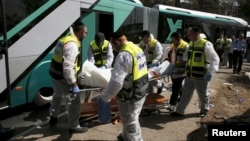U.S. Secretary of State John Kerry says he will travel to Israel and the Palestinian territories to try and move the troubled situation there away from the "precipice."
Kerry told an audience at the Harvard Kennedy School Tuesday evening that he is working to calm the violence between Palestinians and Israelis.
"I will go there soon, at some point appropriately, and try to work to reengage and see if we can't move that away from this precipice," Kerry said.
Jerusalem suffered its deadliest day yet Tuesday amid a wave of Palestinian attacks this month, with at least three Israelis killed.
Two Israelis were killed when a Palestinian with a gun and another with two knives attacked passengers on a Jerusalem bus. Israeli security forces on the scene shot one of the attackers and wounded the other. Elsewhere in Jerusalem, a man crashed a car into people at a bus stop, then got out of the vehicle and began stabbing pedestrians. One person was killed and several were injured. That attacker was also shot.
A third attack took place in Raanana, just north of Tel Aviv, where authorities said an assailant stabbed a civilian at a bus stop before being subdued by others and detained by police.
More than a dozen Israelis were wounded in the three attacks.
'Escalating tensions'
In Washington, the White House condemned the killing of three Israelis on Tuesday, expressing concern about "escalating tensions" after seven Israelis and 29 Palestinians, eight of them children, were killed this month.
White House Spokesman Josh Earnest said that the U.S. condemns in the strongest possible terms the terrorist attacks against Israeli civilians that have resulted in the loss of lives and numerous injuries. Ernest called on all sides to show restraint.
"The United States continues to stress the importance of condemning violence and combating incitement and we're in regular contact with both the Israeli government and the Palestinian authority. We continue to be deeply concerned about escalating tensions and urge all sides to take affirmative steps to restore calm and prevent further actions that would further escalate tensions."
In a speech to parliament, Israeli Prime Minister Benjamin Netanyahu said his government will use all means available to end the Palestinian violence and is working on implementing new security measures. He also urged Palestinian President Mahmoud Abbas to stop inciting the violence.
At least seven Israelis have been killed and more than 25 others wounded in a series of stabbings and other attacks by Palestinians during the past two weeks. Twenty-five Palestinians have been killed, mostly by Israeli police responding to the attacks and by soldiers firing at Palestinian protesters throwing rocks and firebombs.
'Knife terror'
Netanyahu said in an address to parliament on Monday that Israel will overcome "knife terror."
He blamed Hamas, the Palestinian National Authority, and a group called the Islamic Movement for inciting violence and spreading what he called "lies" that Israel is planning to completely take over an east Jerusalem holy site revered by both Muslims and Jews.
He also appealed to Israel's Arab citizens to turn their backs on violence and choose coexistence.
But the prime minister reserved his harshest comments for an Israeli Arab member of parliament, Haneen Zoabi, who called for a full Palestinian uprising. Netanyahu said Zoabi must face a criminal investigation for advocating mass terrorism against Israelis. He said she is unworthy of being a member of the Knesset.
Abbas blamed the wave of violence on "acts of aggression" by Israeli settlers.
The Palestinian ambassador to the United Nations, Riyad Mansour, appealed to the Security Council on Monday to take "real action" to bring calm and demand Israel immediately stop "aggressions" against Palestinian civilians.
Palestinians are already frustrated by continued Jewish settlements in lands they want for a future state. Many regard President Abbas as weak and are ignoring his appeals for calm.
Israel says the settlements are an essential part of its security. It accuses Palestinians of being unwilling to negotiate peace and refusing to recognize Israel's right to exist.
Palestinian spokesman Saeb Erekat said violence was a “natural result” of the policies of the Israeli government and the occupation.
Robert Berger contributed to this report from Jerusalem; Aru Pande contributed from the White House.




